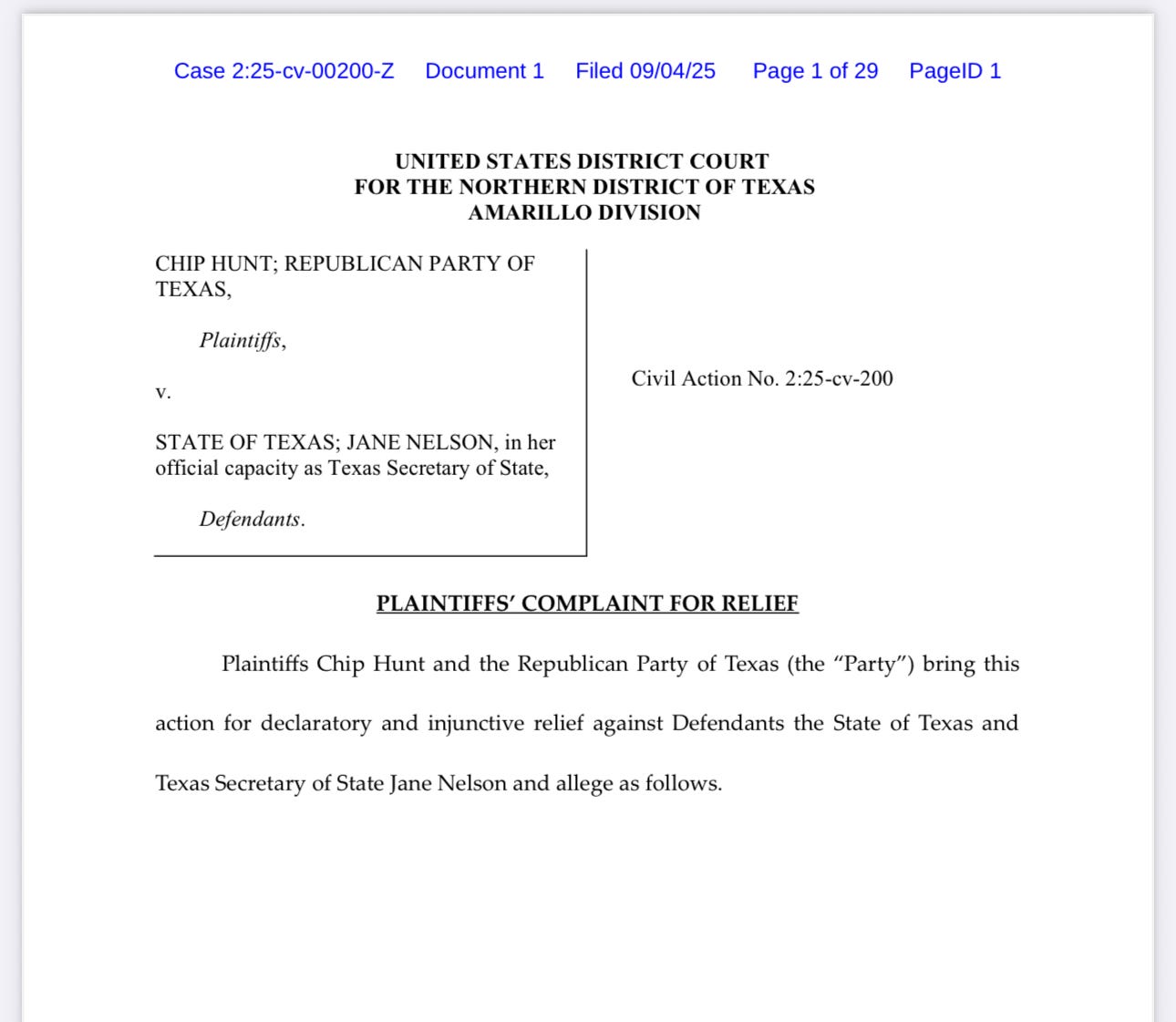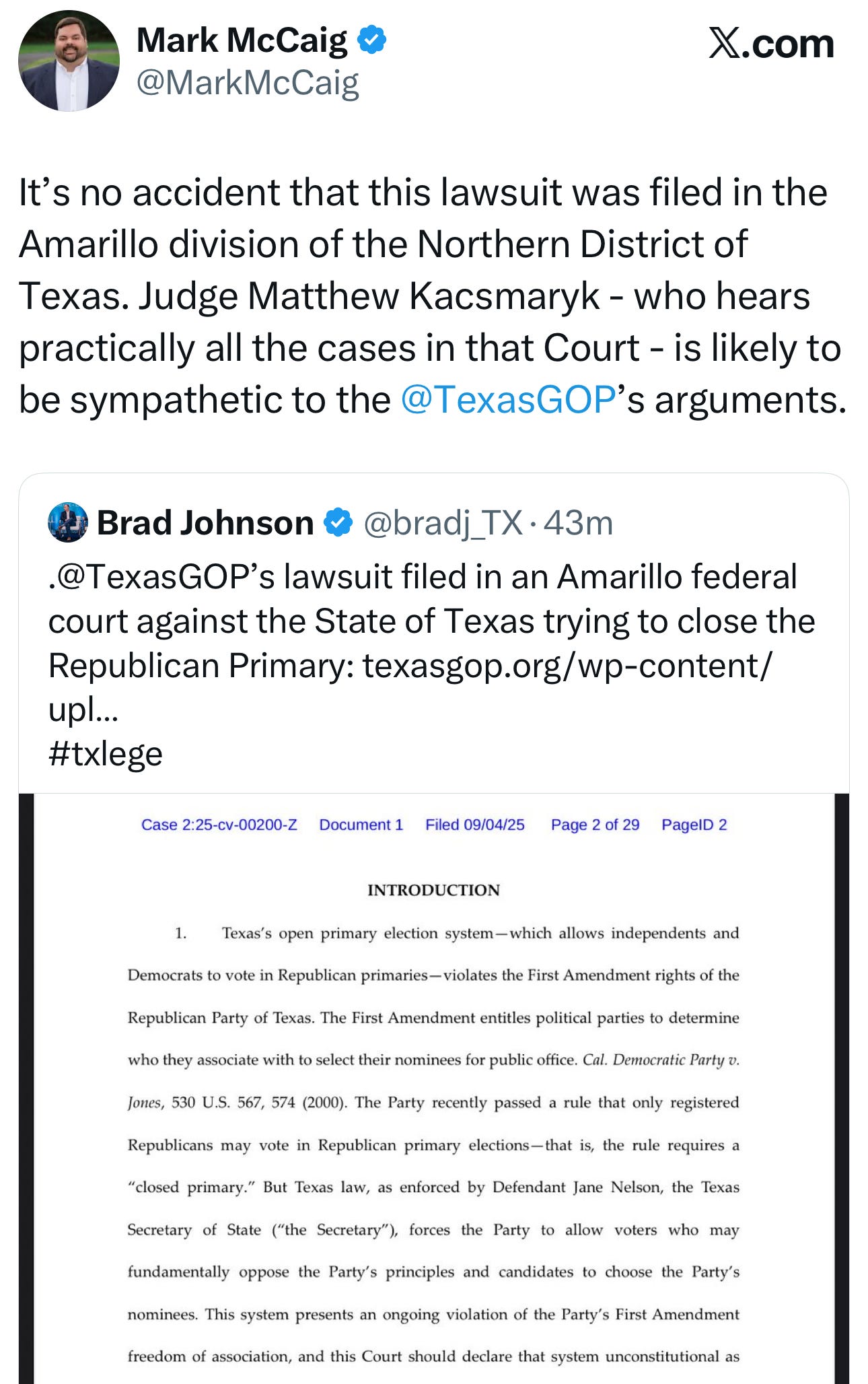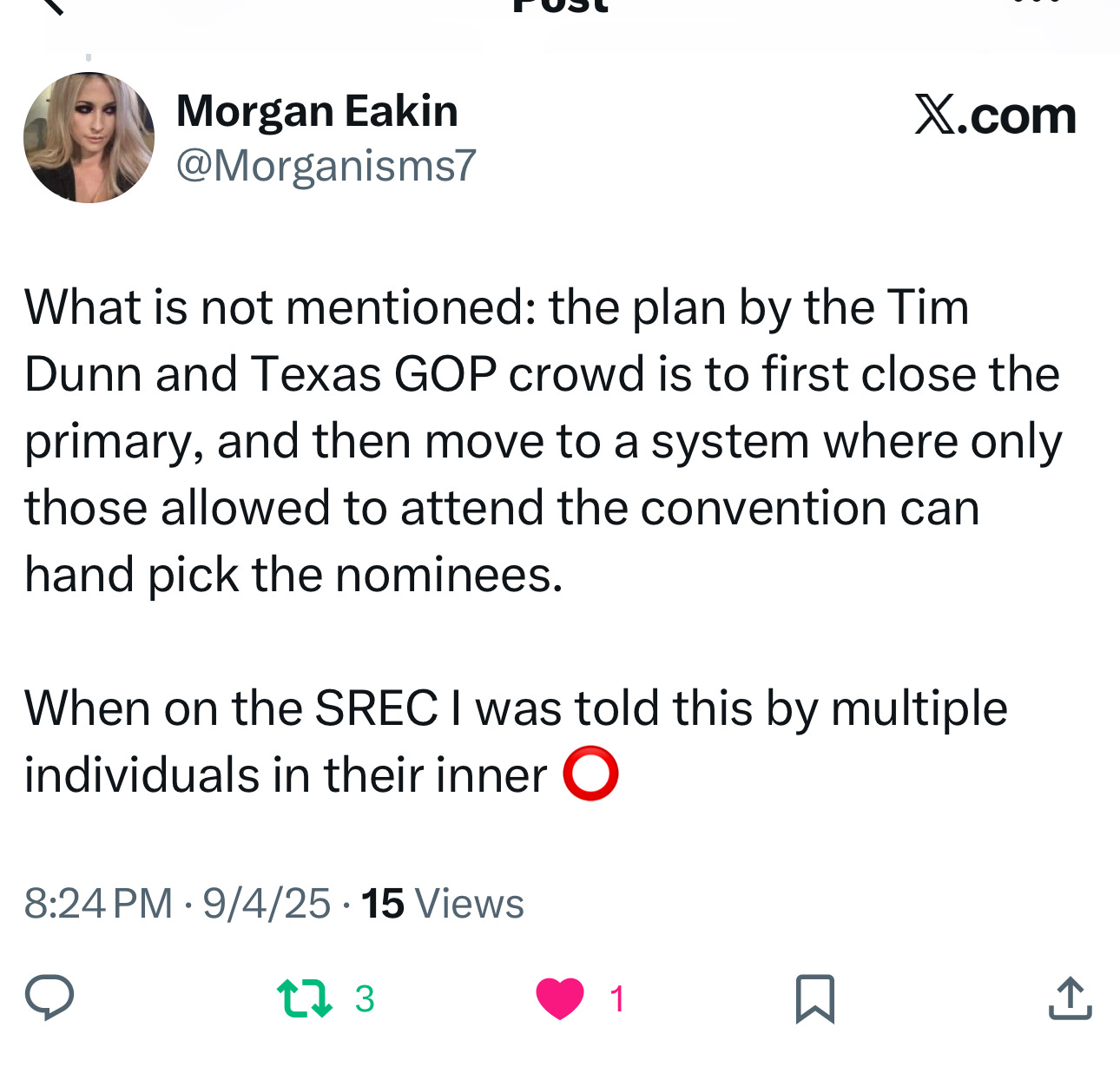Texas Republican Party Sues State Over Open Primary System, Citing First Amendment Violations
In a move to reshape how Republican nominees are chosen in Texas, the Republican Party of Texas (RPT) and precinct chair Chip Hunt filed a federal lawsuit today against the State of Texas and Texas Secretary of State Jane Nelson. The complaint, filed in the U.S. District Court for the Northern District of Texas (Amarillo Division, Case No. 2:25-cv-00200-Z), argues that Texas’s open primary election system violates the RPT’s First Amendment right to freedom of association by allowing non-Republicans to vote in its primaries. The plaintiffs are seeking a court declaration to strike down the open primary system and pave the way for closed primaries, where only registered Republicans can select party nominees.
The Heart of the Dispute: Open Primaries and Crossover Voting
Texas’s primary election system, governed by the Texas Election Code, allows any registered voter—regardless of party affiliation—to vote in either the Republican or Democratic primary by simply requesting that party’s ballot. This “open primary” system, enforced by Secretary Nelson, means independents and even Democrats can influence who becomes the Republican nominee for public office. The RPT contends this setup infringes on its constitutional right to determine its own membership and choose nominees who reflect its values, citing landmark U.S. Supreme Court cases like California Democratic Party v. Jones (2000) and Democratic Party of the U.S. v. Wisconsin ex rel. La Follette (1981).
The lawsuit highlights “crossover voting” as a core issue, where non-Republicans strategically vote in Republican primaries to sway outcomes. Studies cited in the complaint show crossover voting rates in open primary states ranging from 10% to as high as 49%, with Texas’s Republican dominance making it particularly vulnerable. Since 1994, no Democrat has won a statewide office in Texas, and Republicans have controlled the state legislature since 2003, making Republican primaries the “only game in town” in many races. This dynamic, the RPT argues, encourages Democrats and independents to vote for moderate or weaker Republican candidates to either align with their preferences or boost Democratic chances in general elections.
In the 2024 Republican primary runoff for Texas House Speaker Dade Phelan, won by 389 votes out of 25,000 cast, with the RPT claiming nearly 9% of voters were “known Democrats.” Similarly, State Representative Gary VanDeaver’s 2024 primary win by 763 votes in a district with no Democratic opponent suggests crossover votes may have tipped the scale. RPT argues these outcomes distort its ability to select nominees who truly represent its platform and force candidates to moderate their messaging to appeal to non-Republicans.
The Push for Closed Primaries: Rule 46
In response to member outcry and a 2024 primary ballot proposition where 73% of voters supported closing primaries, the RPT adopted Rule 46 in 2024, later strengthened in 2025. The rule restricts voting in Republican primaries to U.S. citizens eligible to vote in Texas who are registered as Republicans with the Secretary of State. “Only Republicans should pick Republican nominees,” the RPT declared in a press release, emphasizing that open primaries allow “Democrat interference” that weakens candidates and dilutes party values.
The lawsuit notes that the Texas Legislature was aware of Rule 46 but failed to act. In 2025, two bills—House Bill 951 and House Bill 934—were introduced to implement closed primaries, with provisions for a transitional “bridge” election in 2026 allowing unaffiliated voters. However, neither bill passed, leaving the open primary system intact. The RPT reached out to Secretary Nelson in February 2025, seeking confirmation that she would honor Rule 46 for the 2026 primaries, but she indicated she would follow existing law, which requires open primaries and only certifies nominees chosen through that process.
The RPT and Hunt assert that Texas’s open primary system imposes a “severe burden” on their First Amendment associational rights by forcing the party to include non-members in its nominee selection process. Citing Jones, the complaint argues that political parties have a constitutional right to exclude non-members from choosing their “standard bearers,” as even a single election influenced by outsiders could “destroy the party.” The plaintiffs claim the system is not narrowly tailored to serve a compelling state interest, rendering it unconstitutional as applied to the RPT.
Without court intervention, the RPT warns, it will be forced to continue using open primaries, risking further distortion of its nomination process. While the party prefers a legislative solution where the state maintains a voter registration list by party affiliation, it is prepared to create its own registration system if necessary. However, this would require significant time and resources, and the RPT seeks legal certainty from the court to ensure Secretary Nelson cannot block nominees chosen through a closed primary from appearing on the general election ballot.
Relief Sought and Broader Implications
The plaintiffs request a declaratory judgment that:
1. The RPT has a constitutional right to select nominees through a closed primary system.
2. Texas Election Code provisions requiring open primaries (e.g., §§ 162.002, 162.003, 162.012, 172.001, 172.086, 172.125) are unconstitutional as applied to the RPT.
3. The defendants be enjoined from enforcing these provisions against the RPT.
They also seek attorneys’ fees and costs. The lawsuit draws on precedent from Idaho Republican Party v. Ysursa (2011), where a federal court struck down Idaho’s open primary system, leading to legislative adoption of closed primaries. The RPT hopes a similar ruling will either prompt the Texas Legislature to act or allow the party to implement its own closed primary system by 2028 if the 2026 cycle remains open.
Looking Ahead
This lawsuit marks a challenge to Texas’s electoral framework, with potential ripple effects for how political parties control their nomination processes nationwide. For the RPT, it’s a fight to protect its identity and ensure its nominees reflect the will of its members—not outsiders. As the case moves forward, all eyes will be on whether the court agrees that Texas’s open primary system crosses a constitutional line, potentially reshaping the state’s political landscape.
Attorneys for the plaintiffs include C. Eric Vickers (Vickers Law Firm, LLC) and William T. Thompson and Mark M. Rothrock (Lehotsky Keller Cohn LLP). The filing is publicly available at the RPT’s website.



